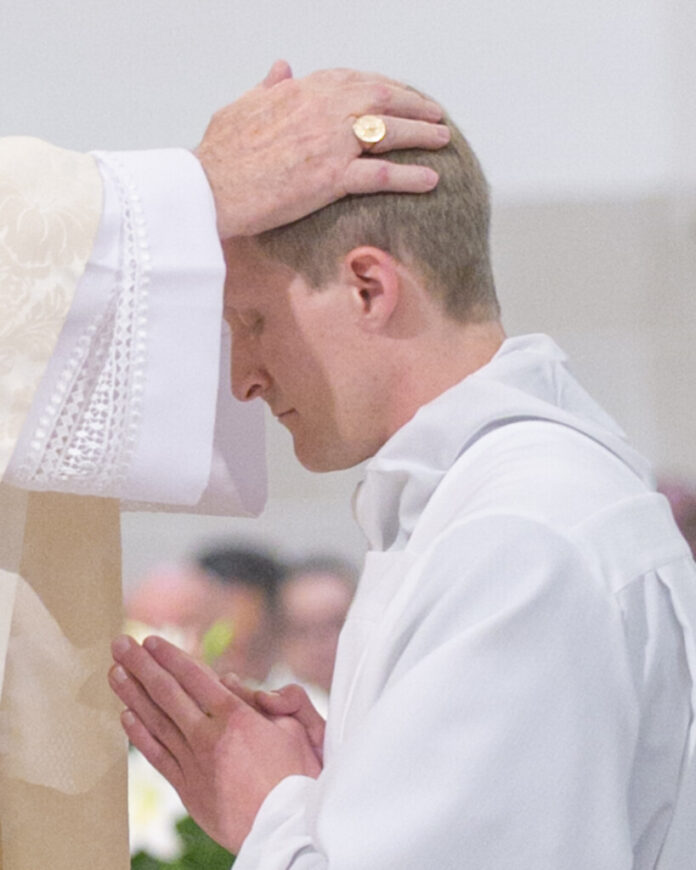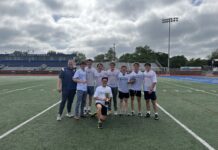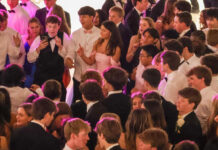On Saturday May 20th, Bishop Edward Burns ordained eight men. Three of these ordained men are Jesuit graduates: Fr. Kevin Kolker ’11 , Fr. Cesar Garcia ’14, and Fr. Miguel Sotelo ’14. On August 24, Associate Editor Sebastian Suwanda ’26, Managing Editor Anthony Nguyen ’24, and I interviewed Father Kevin Kolker. We were able to learn more about Father Kolker’s priestly formation and his time at Jesuit which helped him become inspired to be a priest.
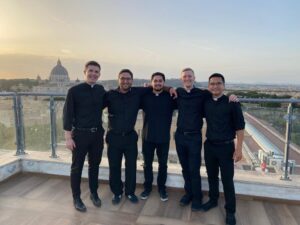
How do you recall your time here at Jesuit?
One thing I really appreciated was the brotherhood. I mean, it’s always emphasized from day one, that you are part of a band of brothers. As a guy, it’s fun to just be in this band of brothers as a high schooler.
“I appreciate the idea of brotherhood as well as the emphasis on service that stuck with me and the service projects that we do as classes and individually.” – Fr. Kolker
One other thing I’ll mention is the award ceremonies they do at the end of the year. One of the awards they do is called the Pedro Arrupe Award. So, Father Arrupe was a Jesuit priest, and he was the superior of the order. There’s one quote of his that’s really powerful where he was speaking with a bunch of Jesuits and talking about our need to fall more in love with Christ. Somebody piped up and said: “Well can you get a little more practical because that’s nice in theory, but we deal with the day in and day out.” So Father Arrupe responded that: there’s nothing more practical than falling in love in a definitive way; falling in love determines what gets you out of bed in the morning, what books you read, what movies you watch, who you hang out with, and what breaks your heart.
So fall in love and stay in love, and it will change everything. So, I know that’s a bit far from the original question of recalling my time at Jesuit. But for the Pedro Arrupe award, I think it’s important to know that sort of background for him – that he was a man who focused on relationship with Jesus Christ, because that changes everything.
Do you notice any major changes to the campus since you left in 2011?
Certainly. I haven’t even been over all of campus, but the David Segal Aquatic Center was not there when I was here. That was probably the biggest change.
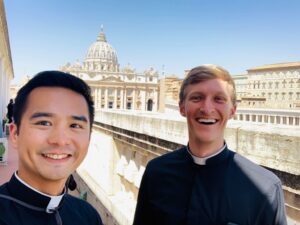
What compelling point in your life brought you to the decision of becoming priest?
So, it certainly was a process, and a process of wrestling with the decision. In one way, it was from 8th grade when I received the sacrament of Confirmation and heard the invitation to priesthood. That sense of being called was there, but it was sometimes strong and sometimes less strong of a call.
As a middle schooler entering high school, there was always an attraction and a fascination with the idea of what priests do and who they are. They’re kind of set apart and like foreign in a sense. I mean, you grow up in a family so you know about family life, but you don’t know what a priest does exactly, other than that you see him at mass, you go to confession, maybe you know he helps out at the school.
So, there was a fascination with what a priest does. A priest does all the most important things for our faith like celebrating Mass – he brings us Jesus in the Eucharist – and he brings us God’s forgiveness in Confession. So there was a real sense of how amazing that was, but there was also for me an element of it being foreign.
With all that, there was still a fear in my heart at the thought of being called to be a priest – I knew it would be hard and involve making many sacrifices, including giving up having my own wife and family. I wrestled with that fear for years and I would say a sort of compelling point, the real turning point was not through one particular moment but over time, particularly through a relationship of prayer.
So, by the time I got to senior year of college, I was still wrestling with why there is anxiety or that fear in my heart over what my vocation is, and the possibility of it being priesthood. So I dove into prayer and focused on the fundamental things, like the fact that God is not some tyrant out there giving us marching orders, but rather He is our Father and has created us with desires that he himself wants to fulfill. It was this realization, through prayer, that the priestly vocation that had been on my mind for years now is not something external that I’m forced to do but is actually the desire of my own heart: I wanted to be a priest. So that’s kind of that compelling turning point, during my senior year of college.
Was there anything at Jesuit or anyone in particular that also made you keep on thinking about priesthood?
Certainly. So, in general during my time at Jesuit I was very involved in my youth group at my parish; that was a big influence on [my] faith formation through what I was receiving there and the friendships I formed there. More connected with Jesuit itself, some of the priests here were a positive influence. In particular, now he rests in peace, Father Raymond Fitzgerald, who wasn’t here much but he was a Jesuit priest and came here from time to time. He was just clearly a man of God who cared very deeply about the students and invested in the guys that he knew very personally. I also did a discernment night with Jesuit priests one time back in the rectory, which I think was still connected to campus at the time. So that’s kind of the aspect of my actual time here on campus that was influential for priesthood in particular.
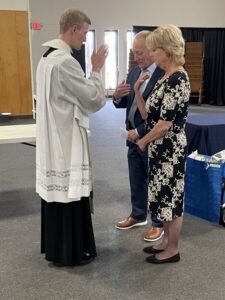
As a newly ordained priest, how is the transition from previously being a deacon and seminarian?
It definitely is a big difference. In one sense there’s so much continuity with all the habits that you build during formation, which remain essential. That’s why we spend time in seminary building this life of prayer and a rhythm of life around learning our faith deeply in the classroom. So all of those things carry over and you have these habits and these tools in your tool belt that you rely on as a priest.
“I felt the benefit of having that time of priestly formation where you get used to rising very early and spending time with our Lord in prayer first thing in the morning. We need that as a priest, or we have nothing to give to the people.” – Fr. Kolker
That said, there is a huge difference, and I think that difference lies in what we’re called now, Father. People address me as Father, and that sense of real spiritual fatherhood is something that we’re living at all times, but of course particularly comes out in the sacraments and Mass. I’m very aware every time that I’m walking on sacred ground in any of those situations and especially when somebody is confessing. Of course, they’re confessing to God, and yet they verbalize that to me as a priest and I stand there in the person of Christ and give absolution. It’s such a remarkable privilege and it’s clearly in those sacraments that I experience the huge difference from before priestly ordination. I think across the board it’s the reality that now I am a spiritual father, and not just a seminarian who can be very helpful or a Deacon who can preach, which is already an astounding thing. But I am a spiritual father and a priest who can now offer Mass and confession.
Can you walk us through your formation starting with after you entered the seminary? Did you travel for your formation?
For a diocesan priest our formation is six to eight years, and studying is a primary thing. There are many other aspects to it while you’re studying, but the years are built around kind of the school calendar, so we have fall and spring semesters. There are a couple of years of studying philosophy and then four years of studying theology. Built into the rhythm of those years are also your pastoral assignments – maybe helping with the youth group, helping teach RCIA, helping with the visits to those in the hospital, things like that. So, you’re getting a great variety of the things that you end up doing as a priest.
There’s kind of your intellectual component, your pastoral component, and the community component that we live in a seminary. It’s like everything that you need is right there – your dorm, your cafeteria, chapel, and workout room. All of that is in one big building essentially, and you live there together day in and day out with the other 80 or 100 guys. So, there’s a real significant fraternal and communal aspect to it, and of course also prayer, the spiritual component, that you’re building your life around. In the morning we’re in the chapel together praying morning prayer, mass in the middle of the day, and evening prayer together a little bit before dinner. Now that’s kind of life in the seminary, but there are also times when we’re assigned for months at a time to a parish because, of course, diocesan priesthood is so centered on that parish experience, where you go to mass on Sunday.
But as priests, we can be assigned anywhere in the Diocese of Dallas, so we get a variety of experiences. For instance, I’m at Christ the King now, very much here in in Dallas.
As a seminarian I was assigned to Corsicana, at Immaculate Conception parish down there. That’s the far southern edge of the diocese. I’ve also been assigned to St. Mary’s in Sherman, which is an hour north, almost at the Oklahoma border. So we get a variety of parish experiences and other opportunities along the way. For things like Spanish immersion, we usually go to Mexico or to Guatemala or to Honduras to study Spanish and get a mission experience.
“We had …time… focusing on ministry to the homeless for a 3-4 week program where we were just everyday walking the streets talking to people living in tents or under bridges. It’s really exercising that ministry to the poorest of the poor.” – Fr. Kolker
What is a typical day like for you as a diocesan priest?
So far, everyday has looked rather different, but certainly the fundamentals are prayer and offering mass in the morning with the usual crowd that comes every day. Then it could be a variety of things after that. For instance, we have a school, so at the school, I go visit the students with some frequency, whether that’s just being present as the parents are dropping off their kids, visiting classrooms, and talking about a Saint of the day or just open Q&A with them, or being in the lunchroom with the school kids. So things like that, along with a variety of sacramental needs.
On any given given day, we could have a funeral that’s scheduled at the parish, going to the hospital for an anointing of the sick or any other various appointments in the middle of the day (e.g. someone asking for spiritual guidance). No two days have been totally alike so far as a priest, which I find exciting.
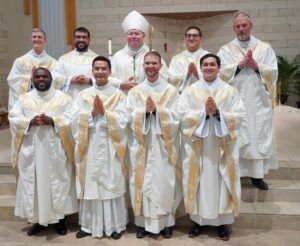
What was your main reason for choosing to be a diocesan priest over a certain order?
I did think about a couple orders, especially because I had the Jesuit connection here, and I actually started my priestly formation with a community based out of Kansas City. The main thing is with an order you are aligning yourself with the conviction that God has given me this charism that this order has. Essentially, I started with a group called the Apostles of the Interior Life because of that charism of focusing on your interior life, helping people to nurture their spiritual life, their relationship with our Lord through prayer really appealed to me. The ultimate discernment came through recognizing, as I was with that community and living their rhythm of life day in and day out, I realized so much of what had attracted me to the priesthood in my youth was the experience that I had in the parish and the availability of a diocesan priest in the parish. The parish priest goes over to dinner with a family, or attends the parish youth group, or RCIA. He’s in the rhythms of community life to just be present. This varies a lot between the orders, but the one I was in, I realized that six of the seven nights a week we were at dinner together as a community because that is the priority. There was that disconnect with what attracted me to priesthood – this constant availability for people and being able to jump into whatever is going on at the parish. Well, that’s actually indicative of the diocesan vocation which has as its charism zeal for souls – as all priests should have – together with a radical availability to the people. Your time is available for what your parish needs, so that’s what led me to diocesan priesthood.
President Earsing designated this year’s theme as “Open to Growth.” Taking that into consideration, what would your advice to students be at the beginning of this year?
Put the first things in your life first, and really reflect on your priorities. What are the most important things in your life? Think long term by looking at 5-10 years down the road. Do not think of this as goal setting, like what kind of job do you want to have, what kind of money do you want to make, but what kind of man do you want to be and what kind of man does God want you to be.
Think with that big picture in mind, and then begin small on a daily basis. What does it look like to take one step in that direction today? This helps us avoid two mistakes: we can either be so focused on just goals in the world, which are not all bad by any means but they aren’t what God will ask us about at the end of our life; or we can look at what kind of man we want to be and be discouraged by our realization that it’s hard to grow and that we keep making the same mistakes over and over again. So this combination of long-term visioning of what kind of man God wants me to be and a concrete focus on taking one step toward that today, can help us avoid both pitfalls.” – Fr. Kolker
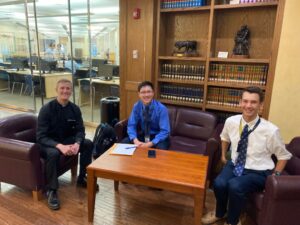
Conclusion
It was a pleasure to have the opportunity to hear Father Kolker’s journey to priesthood, and also hear his message of how to grow in faith and in a relationship with God.
Stay tuned to read about Fr. Cesar Garcia ’14 and Fr. Miguel Sotelo ’14 journey to priesthood as well!


